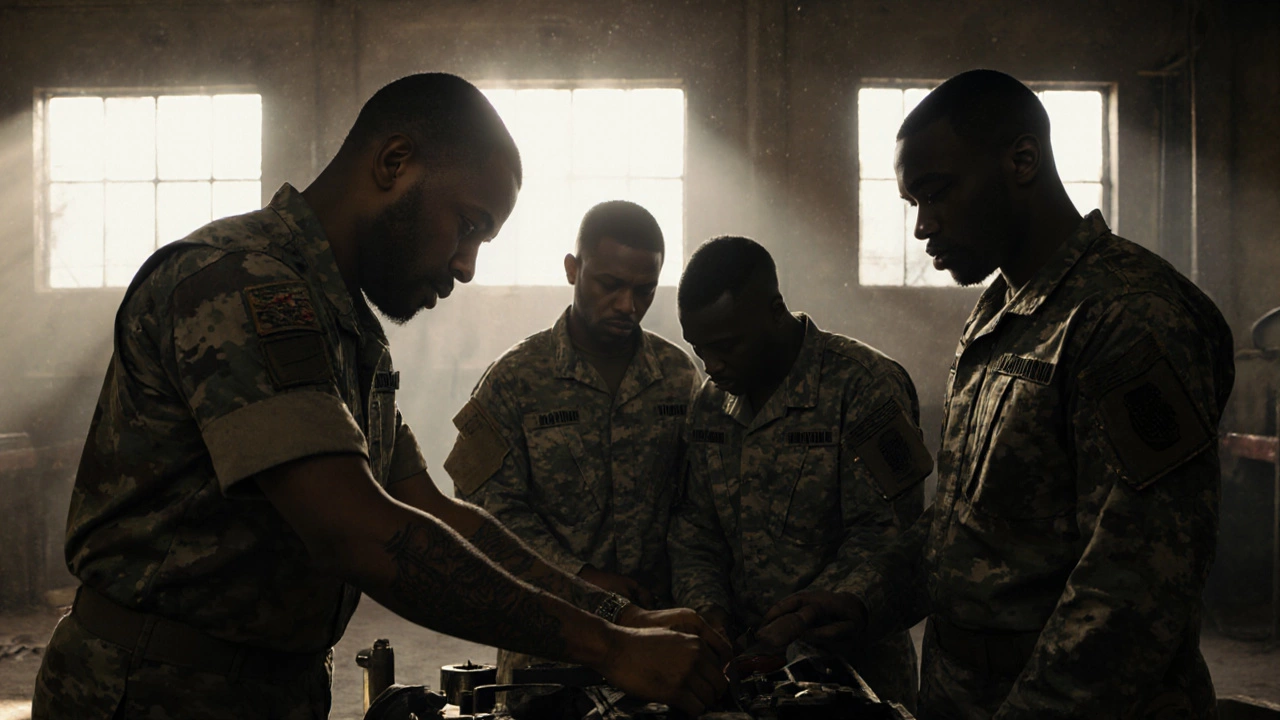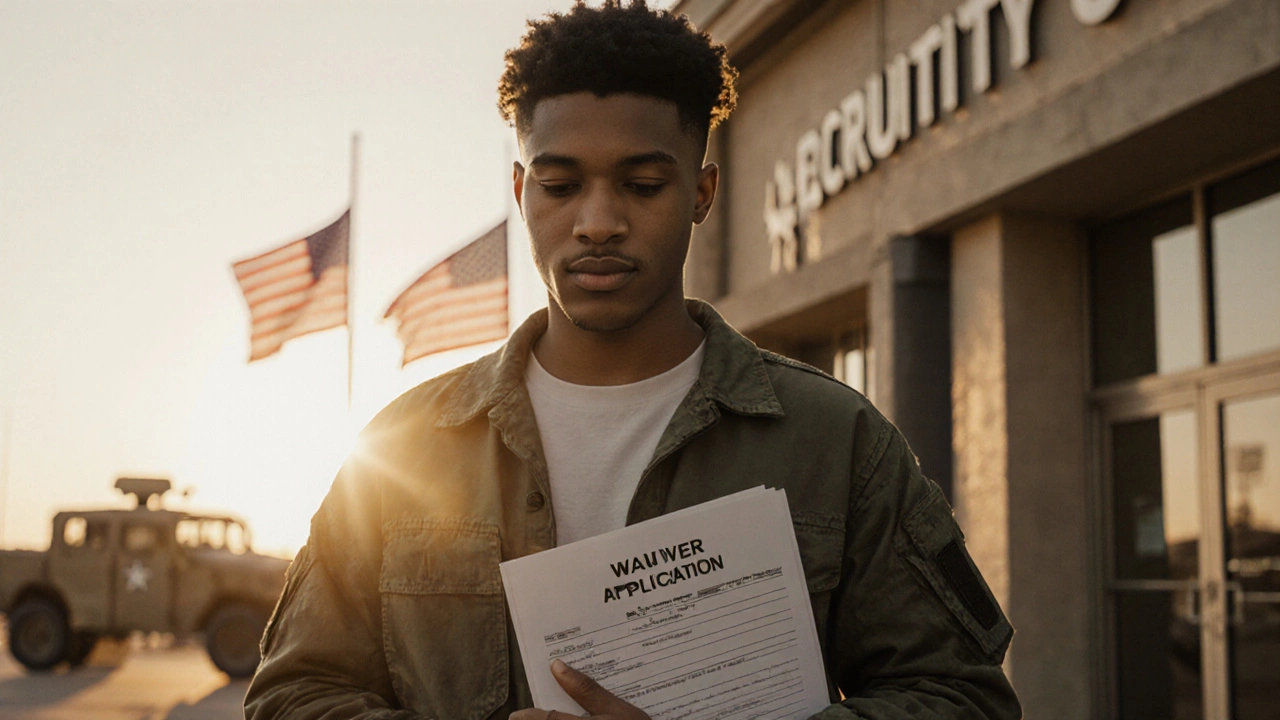Military Felony Eligibility Calculator
This tool helps you assess your likelihood of obtaining a military waiver based on your criminal history. Based on 2025 military policies.
Your Military Eligibility Assessment
Enter your information and click Calculate to see your eligibility assessment.
Can a felon join the military? The short answer is: sometimes-but it’s not easy, and it’s not automatic. If you’ve got a felony on your record, the military doesn’t automatically say no. But they don’t say yes either. It depends on what you did, when you did it, how you’ve changed since, and whether someone in the chain of command is willing to make an exception.
What Counts as a Felony for Military Purposes?
A felony isn’t just any crime. In the U.S. military, a felony is any offense punishable by more than one year in prison. That includes violent crimes like assault, robbery, or burglary. But it also includes non-violent ones like drug trafficking, fraud, or even certain types of tax evasion. The military doesn’t just look at the charge-they look at the actual conduct, the number of offenses, and whether there were victims.
For example, a single conviction for possession of a small amount of marijuana five years ago might be treated differently than three convictions for selling it. A DUI from college might not block you if it’s your only offense. But a conviction for sexual assault? That’s an automatic disqualification-no waivers, no exceptions.
The Waiver System: Your Only Path In
If you have a felony, your only real shot at joining is through a moral waiver. This isn’t a form you fill out and mail in. It’s a request made by your recruiter, reviewed by a board, and approved only if the military believes you’ve turned your life around.
Here’s what they look for:
- Time passed: At least three years since your last arrest or completion of sentence. Some branches want five.
- No recent offenses: No arrests, probation violations, or even traffic tickets in the last year.
- Stable employment: You’ve held a job for at least a year. Volunteering or community service counts too.
- Education: High school diploma or GED. Some branches prefer college credits.
- Character references: Letters from employers, teachers, clergy, or mentors who can vouch for your change.
Waivers aren’t guaranteed. In 2024, the Army approved fewer than 5% of felony waiver requests. The Air Force and Space Force are even stricter. The Navy and Marines sometimes approve more, especially if you’re applying for a job that doesn’t require a security clearance.
Not All Felonies Are Treated the Same
The military ranks offenses by severity. They use a system called the Department of Defense Moral Conduct Standards. Here’s how they break it down:
| Offense Type | Waiver Likelihood | Typical Wait Time | Service Branch Most Likely to Approve |
|---|---|---|---|
| Non-violent drug possession (single offense) | Medium | 3-5 years | Army, Navy |
| Property crime (theft, burglary) | Low to Medium | 5+ years | Army |
| Domestic violence | Very Low | Usually denied | All branches |
| Sexual offense | Zero | Never | All branches |
| Fraud or financial crime | Low | 5+ years | Coast Guard (rarely) |
| Multiple DUIs | Very Low | 5+ years | Army |
Some jobs in the military are off-limits even if you get a waiver. You won’t be allowed into intelligence, cyber, or special operations roles if you have any felony record. Even if you get in, you won’t be eligible for a top-secret clearance.

What the Military Checks
They don’t just ask you if you’ve been arrested. They run your name through the FBI’s National Crime Information Center (NCIC) database. They check state and local records. They even look at juvenile records if you were charged as an adult.
And they don’t just look at convictions. If you were charged but not convicted-if the case was dropped or you did a diversion program-they’ll still ask about it. Lying on your application? That’s an automatic disqualification. The military doesn’t care if you got off on a technicality. They care if you were involved.
One real case: A 22-year-old from Ohio was arrested for shoplifting at 19. He served six months probation, got his GED, worked full-time at a warehouse, and volunteered at a youth center. His recruiter submitted a waiver. It took seven months. He was approved for the Army as a mechanic. He’s now serving his third year.
Why the Military Cares
It’s not about punishment. It’s about risk. The military needs people who can be trusted with weapons, classified information, and the lives of their teammates. A felony record doesn’t automatically mean you’re untrustworthy-but it does mean you’ve made poor decisions before. The question is: have you proven you won’t do it again?
They’re also worried about security. Someone with a past drug conviction might be vulnerable to blackmail. Someone with a fraud conviction might be tempted to steal from the government. These aren’t assumptions-they’re based on data. Studies from the Department of Defense show that service members with multiple prior offenses are more likely to be discharged for misconduct.

What You Can Do Now
If you’re serious about joining, here’s your roadmap:
- Get your records straight. Request a full criminal history report from your state. Know exactly what’s on file.
- Wait it out. Don’t apply until at least three years after your last arrest or sentence ended.
- Build your life. Get a job, stay employed, take classes, volunteer. Show consistency.
- Get letters of recommendation. Ask your boss, your pastor, your mentor. Make sure they mention your growth.
- Find a good recruiter. Not all recruiters know the waiver process. Ask for one who’s handled felony cases before.
- Be honest. Never hide anything. The military will find out. Honesty might cost you a waiver-but lying will cost you your chance forever.
Alternatives If You Can’t Join
If the military says no, that doesn’t mean your options are gone. Many veterans’ organizations, government agencies, and even some private contractors hire people with criminal records-especially if they’ve served time, completed rehabilitation, or have military family ties.
For example, the U.S. Postal Service, Department of Transportation, and some state police departments have programs for formerly incarcerated individuals. You can also work as a firefighter, EMT, or in veteran support roles. Some of these jobs even offer tuition help for further education.
And if you’re interested in serving your country, consider the Reserve Components or National Guard. They sometimes have more flexible standards than active duty-especially if you’re applying for a non-combat role.
Final Reality Check
Let’s be clear: most felons won’t join the military. The system is designed to be restrictive. But it’s not impossible. People with felony records have served-and served well. They’re mechanics, medics, truck drivers, and supply specialists. They didn’t get in because they were lucky. They got in because they rebuilt their lives, stayed quiet, worked hard, and showed up every day.
If you’re willing to do the same, the door isn’t locked. It’s just heavily guarded. And the only way through is with patience, proof, and persistence.
Can I join the military if I have a misdemeanor?
Yes, most misdemeanors don’t block enlistment. But multiple offenses or certain types-like domestic violence or drug distribution-can still require a waiver. The military looks at patterns, not just single incidents.
Do I need a lawyer to apply for a military waiver?
No, you don’t need a lawyer. Your recruiter handles the waiver request. But having legal help to clear or seal your record beforehand can improve your chances. Some nonprofits offer free help to veterans and formerly incarcerated people.
Will my felony show up on a background check for the military?
Yes. The military runs a full FBI and state-level background check. Even sealed or expunged records may still be visible to them. Never assume your record is hidden. Always be honest on your application.
Can I join if I’m still on probation?
No. You must complete all terms of your sentence-including probation, parole, or community service-before applying. The military will not accept applicants who are still under court supervision.
What if I was charged as a juvenile?
Juvenile records are reviewed differently. If you were tried as an adult, it counts as a felony. If you were in juvenile court and the case was sealed, it may not block you-but you still must disclose it. The military has access to juvenile records for enlistment purposes.

